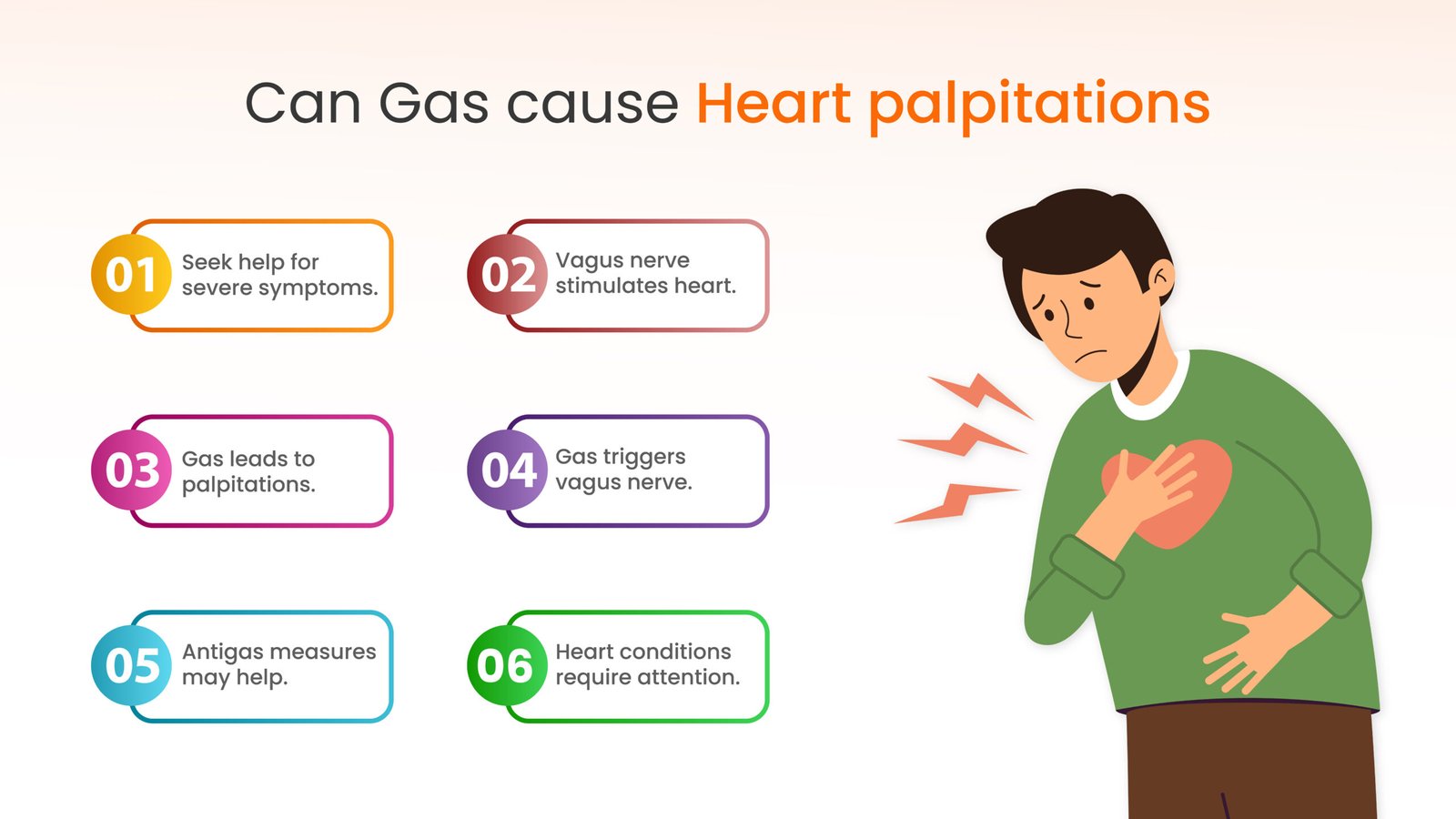
Author:- Mr. Ritesh Sharma
Can Gas Cause Heart Palpitations? This question seems a little awkward. There are many triggers of heart palpitations ranging from physical exertion to mental stress. However, can something as seemingly innocuous as gas cause heart palpitations. No matter how absurd this question sounds, it is something worth contemplating. Heart palpitations, in a normal scenario, are fleeting and lasting for a small amount of time. However, the condition can also be persistent and prolonged and it is caused by a cardiac arrhythmia like tachycardia.
But, out of all these reasons for heart palpitations, can gas be a reason to trigger it. Well, the simplest answer to this question is- yes. However, the gastrointestinal issues do not directly impact the heart. Then how do they impact it? To investigate the intricate connections between Gas and heart palpitations, we have prepared this blog.
Here, we will discuss how gas-induced palpitations occur, the complete mechanism of it, and when to seek medical attention. So, delve into the intricate interplay of gas and heart palpitations and uncover some worthy insights.
Can Gas Cause Heart Palpitations?
To actually find an answer to the question- can gas cause heart palpitations, let’s dig deeper into the anatomy of the human body and the complex connections between different systems:
- Gastrointestinal Distress: The condition of gas, bloating, and other gastrointestinal issues occur normally in people. The main causes of this condition are dietary choices, swallowing air while eating or drinking, bacterial fermentation in the gut, and underlying medical conditions like irritable bowel syndrome (IBS) or lactose intolerance.
- Vagus Nerve Stimulation: The vagus nerve is a pivotal part of the autonomic nervous system. It plays a crucial role in regulating several functions of the body. This includes heart rate as well. The nerve is connected to various organs in the body. This also includes the heart and the digestive tract. When the gas buildup irritates or distends the gastrointestinal tract, the vagus nerve can get stimulated.
- Vagal Response and Heart Palpitations: When the vagus never is stimulated, a condition called “vagal response” is triggered. This response is manifested in several ways, such as changes in the heart rate or rhythm. In some people (especially those who have underlying heart conditions or heightened sensitivity) a vagal response caused by gastrointestinal distress can result in heart palpitations.
The Mechanism of Gas-Induced Palpitations
The mechanism of gas-induced palpitations is explained by the link between the vagus nerve and the heart function. Let’s learn about the complete mechanism below:
- Gas Buildup: Excessive gas in the human body can result in bloating, discomfort, and pain. This gas buildup occurs due to factors like swallowed air, fermentation of undigested carbohydrates, or impaired digestion.
- Vagal Stimulation: The irritated or distended vagus gastrointestinal tract can stimulate the vagus nerve. This stimulation causes a vagal response as it sends a signal to the brain.
- Vagal Response: The vagal response can trigger physiological changes, such as changes in the heart rate. In some cases, this response decreases the heart rate and causes a cardiac arrhythmia of the arrhythmia classifications, bradycardia. On the other hand, sometimes, this response triggers an elevated heart rate and causes tachycardia, i.e. heart palpitations.
- Individual Variability: Everyone who experiences a vagus nerve stimulation does not experience heart palpitations. It depends on various factors and varies from individual to individual. The affecting factors are individual sensitivity, underlying cardiac health, and the severity of gastrointestinal.
How to Identify Gas-Induced Palpitations?
Identifying gas-induced palpitations is not easy. It is hard to distinguish them from the other types of heart palpitations. However, through temporal association, accompanying symptoms, and Response to antigas measures.
- Temporal Association: If the heart palpitations occur after you take a short meal or during the episodes of bloating, gas, or discomfort then they could be likely due to gastrointestinal disturbances.
- Accompanying Symptoms: The accompanying symptoms of gas-induced palpitations align with other gastrointestinal symptoms, such as bloating, belching, flatulence, or abdominal discomfort.
- Response to Antigas Measures: If your palpitations are gas-induced then they might be cured when you take antigas measures.
When to Seek Medical Attention?
Now comes the most important question, when to seek medical attention in case of gas-induced palpitations. While in a normal scenario, the gas-induced palpitations are fleeting are resolve on their own, in some exceptional cases, you might have to seek medical attention:
- Persistent or Severe Symptoms: If the heart palpitations induced by gas are prolonged and persistent and are accompanied by other dangerous symptoms, such as chest pain, shortness of breath, dizziness, or fainting, then it requires prompt medical intervention.
- Underlying Heart Conditions: People who experience gas-induced palpitations along with other underlying heart conditions, such as arrhythmias, coronary artery diseases, and structural abnormalities, might require to visit a healthcare professional.
- Unexplained Palpitations: If the palpitations occur inexplicably and due to no substantial reason and do not go away despite taking antigas measures then it could indicate a serious cardiac condition and you must consult a healthcare professional promptly.
In conclusion, the answer to the question of whether can gas cause heart palpitations is a simple yes. However, the explanation for this is rather intricate. The heart palpitations caused by gas are mostly due to the stimulation of the vagus nerve which causes palpitations in some people. Whether vagus nerve stimulation causes palpitations or low heart rate in you varies from person to person.
Furthermore, if you have gas-induced palpitations, then you must consult a healthcare professional only if the symptoms are persistent and severe, you have underlying heart conditions or the palpitations are unexplained. Otherwise, they might stay for a fleeting period of time and then resolve on their own.



